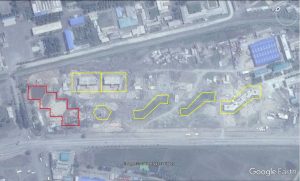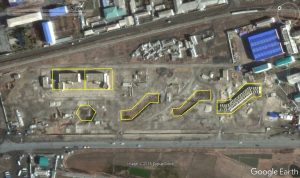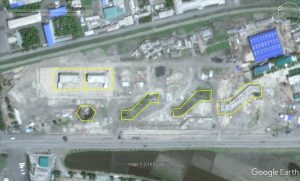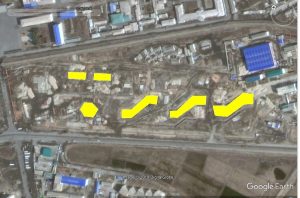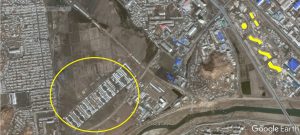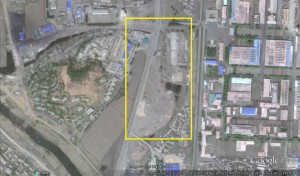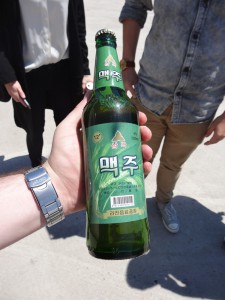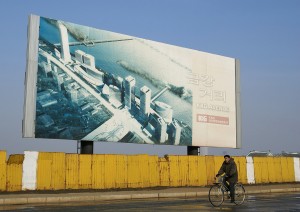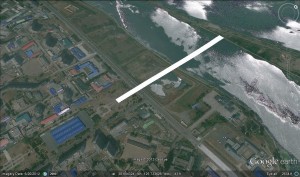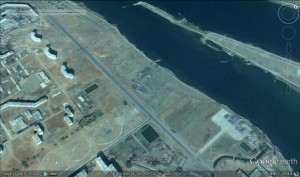UPDATE 1 (2015-6-29): Men under 60 banned from market activities. According to the Daily NK:
With Kim Jong Un at the helm of North Korea, the age limit for commercial activities has been removed for women; for men, however, this limit has recently been raised, allowing only those in their 60s or over to enter market life.
This runs contrary to not long ago, when one could easily spot men in their 40s inhabiting stalls in the marketplace, often selling shoes or offering bike repair services– a common occurrence since residents took to market activities to cope with the widespread famine ravaging in the mid-1990s.
This has changed in almost an instant under the new mandate. “Actions have been taken so that men under 60 cannot run businesses in the jangmadang (market), as the Central Party demands that men should remain loyal to their workplaces,” a source from Yangkang Province informed Daily NK through a telephone conversation on June 26th.
Daily NK’s sources in two other provinces confirmed the news of this directive but for their safety their locations remain confidential.
“At markets in Hyesan there used to be men in their 40s running shoe repair business, cigarette stands or barbershops. But they’re all gone now, and even the stores such as bike shop or key repair shop are being run by men in their 60s,” the source added.
Men’s role in the marketplace has been rigidly controlled since the Kim Jong Un came to power, aimed at preventing workers from doing business rather than fulfilling their roles at state-run factories and enterprises. Women, however, have enjoyed relative freedom in their commercial activities.
Some men have long turned to offering up ‘8.3 money’ to escape the workplace and go out to try their hand at doing business.
The term ‘8.3 Money’ is related to a program of limited enterprise autonomy put in place by Kim Jong Il in 1984. As part of the plan, workers are encouraged to earn money outside their state-mandated workplaces and present de facto tax payments back to their employers. Such contributions are not necessarily defined in monetary terms: wild edible greens and valuable medical herbs (some of which fetch a high price in China) can also be contributions, for instance.
“Most of these men run wholesale or transportation of goods, carrying goods for retail dealers using ‘servi-cha.’ Some men under 60, who once sold goods in the jangmadang, have now turned to the transportation business,” he explained.
In the past, trains were almost the only viable means of long-distance transportation in North Korea. Then, as private business began to grow and the railways further deteriorated, vehicles such as trucks and cars belonging to military bases, state security and state enterprises were pushed into service to earn money for moving people, known as the ‘servi-cha’ industry.
“Even at the beginning of the last year there were many young men selling coal briquettes, salt and other food products [at markets in Pyongsong] but now they’re nowhere to be found,” the source said, citing a merchant from Pyongsong, South Pyongan Province.
Women’s relative freedom in doing business has created avenues for men despite to stay in the game, allowing them to team up with a female counterpart in order to evade the new directive, he said, explaining that in these cases, “men take care of transportation and wholesale of goods, while women take care of actual selling of goods. In this way, they can avoid the regulations.”
According to the source, the Kim Jong Un era has seen little control over people’s market activities. As a result, the number of stores has increased in most of the marketplaces in the whole country, vitalizing residents’ commercial activities.
The logic behind the freshest regulation is that to the extent that the regime has allowed commercial activities–an autonomous means of living for the people who have been suffering chronic shortages of food–men should devote themselves to their state-ordered workplace.
ORIGINAL POST (2015-3-23): It appears there is an informal easing up on unauthorized street vendors near marketplaces. According to the Daily NK:
Alley merchants [also known as grasshopper merchants]– those who sell goods in alleyways to avoid crackdowns by Ministry of People’s Safety [MPS] officials–are now referred to as “tick merchants,” a term coined after their rapid proliferation, according to sources within North Korea.
Affiliated with city and county People’s Committees throughout North Korea, official marketplaces are run by a management center, charged with collecting and handling fees for vendors renting stalls from which to sell their sundry goods.
However, securing a location for their operations is not feasible for a multitude of residents. “Many don’t have enough money to afford to pay for a stall in the marketplace, so they either sell goods in the alleys of villages or by crossroads in close proximity to the jangmadang [North Korea’s system of markets],” a source in North Pyongan Province told Daily NK on February 9th.
Regulation of these “alley merchants,” of whom there are countless numbers, is carried out by the Ministry of People’s Safety and patrol units falling under its umbrella. Frequently, these officials are know to extort merchants under the pretense of regulating illegal market activity, confiscating their goods, only to turn around and return the merchandise as soon as their bribe demands have been met.
Despite the incessant threat of crackdowns and extortion by these officials, “grasshopper vendors” are determined to continue selling their items, desperate to hold onto their “lifelines,” according to the source, who noted a marked difference in this particular sector of the market economy since just last year.
Of this situation, she said, “With February 16th [Kim Jong Il’s birthday] fast approaching, the number of alley merchants has surged [to sell goods for residents preparing for the holiday], as has the number of MPS officials.” She went on to explain that last year, however, these “grasshopper merchants” largely abided orders, fleeing the premises after the MPS units arrived for fear of the repercussions. But this year most are staying put in these makeshift alleyway market areas, even saying things to the officials like, ‘If we got our rations, do you think we would be putting ourselves through this?’
This is how the newly coined term, ‘tick merchant’, came into existence: derived from a common expression in North Korea–regarding how impossible ticks are to remove and keep away before another comes along–these merchants are much the same–refusing to budge despite the consequences, determined to claim their spot in the market system.
Recently, investigations launched by the Central Party, aimed at rooting out reckless misconduct of MPS officials toward residents, are also thought to be contributing to the ease on regulation of these alley merchants. This, coupled with the bribe culture continually infiltrating the “tick merchant” realm–just as in the rest of North Korea–has seen the number of those engaged in these operations spike; nominal bribes of cash or goods ensure, at least for the time being, that they can do business in relative peace. Not unlike those with official stalls inside the market, some even reportedly pay periodic fees directly to the market management, all but guaranteeing their exemption from regulation.
The residents, and even the MPS officials themselves, are not overly preoccupied with regulations and clampdowns, because, as the source put it, “it becomes increasingly difficult for officials to crackdown on merchants selling in the surrounding areas of the markets, entirely reliant on selling goods to survive.”
Many are concerned that the leniency pervading these alley way operations may be fleeting, but the source asserted things will never return to the past. “When the investigations on the Ministry of People’s Safety officials are over, regulation of the alley markets is expected to become stringent again. Still, at this point, it’s next to impossible for these officials to make residents, largely dependent on business to maintain their livelihoods, obey them, meaning eradicating these ‘tick merchants’ is just as improbable,” she concluded.
And the DPRK has begun lifting age restrictions on market vendors. According to the Daily NK:
Amid relaxation of restrictions on market activities, the North Korean authorities began lifting age restrictions for vendors at the end of last year in some regions and, more recently, scrapping the ban nationwide.
“The authorities have been quite lax with clampdowns and regulations of official markets as of late,” a source in Yangkang Province reported to Daily NK on March 20th. “Those previously not permitted stall rights to sell their products are now being granted these privileges, greatly increasing the number of stalls. Also, women below the age of 50 are no longer prohibited from selling at the markets.”
In the absence of age restrictions, markets have seen a marked increase of women selling goods there. According to the source, the North Korean authorities previously regulated trade activities by women under 50 to deter shirking of ideological study sessions or–even more importantly– nationwide mobilization directives for agricultural or construction efforts, The authorities compromised by granting these women permission to participate in these compulsory organization activities only in the morning, freeing up the afternoon for market activities.
“Since last year, the authorities didn’t really implement clampdowns and have even showed a great deal of leniency to those selling in the alleys. As a result, women who previously idled away at home have been propelled into market life, selling everywhere they can,” she explained.
Unsurprisingly, most women are perplexed, if cautiously elated, by the leniency shown by a system that has wielded such stringent power and regulation over them for so long. “The shift in sanctions feels like hell has frozen over,” many have remarked, adding that they “finally have the opportunity to make ends meet.” Still, many are wary, noting that “you never know when the authorities will abruptly declare a new policy or revert to stringent clampdowns.”
She added that while the state did not lift the restriction to “improve people’s lives” as it claims, it has had a positive impact nevertheless. According to the source, North Korea’s motives for the lift begin and end with procuring funds. “There are thousands of stalls in Hyesan Market; this yields huge profits for the state who collect the fees vendors pay to use the space,” she pointed out.
That said, she maintained a sanguine outlook, remarking how empowering it is to see women effecting change in the markets by expanding their inroads into this sector, while making significant, if not dominant, fiscal contributions within their individual households. “Whereas there were only older women in the markets in the past, you can now easily spot women in their 20s and 30s in the industry,” she explained.
Surprisingly, the reduced regulations have increased rather than diminished participation in state mobilization efforts– such as compost collection or “loyalty singing sessions”– because women are afforded a bit more breathing room from unceasing concerns about how to secure their next meal. The positive results are already palpable, according to the source, who said that “most families are better off now due to women’s increased forays into the market domain.”
Read the full story here:
Crackdowns Ease Up on Alley Merchants
Daily NK
Seol Song Ah
2015-02-11
NK Lifts Market Age Restrictions
Daily NK
Kang Mi Jin
2015-03-23

